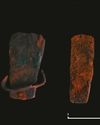
AROUND the halfway mark in Vishal Bhardwaj's Haider (2014), we enter Faraz Cinema. "Main hun diwaana tere pyaar ka, peecha na chhodunga tera," sings Salman Khan, like a dutiful stalker, on screen. A wide shot shows the Indian Army officers, as viewers, enduring varied stages of boredom-some drinking, some sleeping, some barely awake. Then, a door opens, and convicts line up in front of the screen. An officer signals the projectionist to stop; the interrogation-or the real film-has to start.
This Hamlet adaptation, much like its setting, Kashmir, inverts conventions, mocks normalcy, and distorts identities.
So a theatre, promising freedom from the captivity of mundane life, functions as a prison. The multiplicity of identities here isn't just restricted to inanimate things.
Because in the same theatre, Haider's father, "Doctor" (Narendra Jha), notices an "aasteen ka saanp"-a man whom he considered bhai, Khurram (Kay Kay Menon), morphed into the Army's informer-a brother turned betrayer. In a drama centred on a conflict-torn land, coveted by two countries, it makes poetic and perfect sense that dualities define Haider.
Consider its more literal example: the Army officials stopping and checking the IDs of regular Kashmiris, reminding them that they need permission to enter their own homes. Or making them feel, as a character says later, that "All of Kashmir is a prison". These ID checks, even more than the Faraz Cinema scene, examine and extrapolate identity and duality, as the 'correct' documents make all the difference: between allowed and detained, insider and infiltrator, home and prison.
Denne historien er fra October 11, 2024-utgaven av Outlook.
Start din 7-dagers gratis prøveperiode på Magzter GOLD for å få tilgang til tusenvis av utvalgte premiumhistorier og 9000+ magasiner og aviser.
Allerede abonnent ? Logg på
Denne historien er fra October 11, 2024-utgaven av Outlook.
Start din 7-dagers gratis prøveperiode på Magzter GOLD for å få tilgang til tusenvis av utvalgte premiumhistorier og 9000+ magasiner og aviser.
Allerede abonnent? Logg på

Friendship Loveship Hateship
The world is presently battling a loneliness epidemic, but it’s the well-connected’ who are the loneliest. These days, they are looking to make connections at social meet-ups

Scripting Loneliness
With the turn of the millennium, Indian audiences got to see what actually happens when fairytale romance ends and life begins on the big screen

Confined, Constricted
Love and loneliness co-exist in spaces where desires struggle to navigate through narrow lanes, love flounders to flourish in tiny homes and heart-to-heart conversations get muted in the cacophony of everyday drudgery

Rusted Ruins
Archaeology trapped in jingoist trenches

BJP's Delhiverance
The double engine sarkaar will have to show some quick results to Delhi's middle class which has trusted it to improve the city’s infrastructure

AAP Rejected, or BJP Elected?
ls the electorate voting to reject rather than voting to elect?

Crying in Love is to Grow in Love
To be in love is to check one's mortality and start with the quiver of optimism

Half Moon
Desire is not Just about the body but the entire world through the body. In fact, the world becomes the body of the absent lover

Love, Actually
British novelist and scriptwriter David Nicholls is the author of six novels, including the global bestseller One Day (2009).

Big City Blues
Queer people find vibrancy and welcome anonymity in megacities but there is a limit to the choices they offer